"[Trudeau] probably should have consulted an astrologer!"

JustinTrudeau | Twitter, Mary Hammel | Unsplash
Sarah Rohoman
September 18, 2021
The 2021 Canadian federal election falls on a full moon this year and it could have an effect on the results, according to a Canadian astrologer.
"When I looked at Justin Trudeau's chart and I looked at Erin O'Toole's chart — his main rival — it was really hard to see a clear winner," said Laurien Rueger, writer and astrologer at Astrology, Eh?.
"They both are facing a lot of challenges," she said. "So it was very difficult to pick one or the other. And I came to the conclusion that it's going to be very tight, and it's going to be a minority government."
Rueger believes that the phase of the moon will have an impact on the election.
"There's a full moon on election night, which usually suggests a time when we're going to be fully aware of a situation. Things culminate on full moons," she said. "But at the same time, we've got a very Neptunian influence, which casts a light of uncertainty."
Based on a factor of celestial movements, Rueger thinks O'Toole has a shot at winning.
"I'm thinking either he's going to win the election and he's going to struggle to build confidence to stay in power because he's going to be outnumbered by the Liberals and the NDP and the Greens, or he's not going to win and he's going to have to fight to retain his leadership of the Conservative Party," Rueger explained.
As for the election being called in the first place, Rueger said that Trudeau should have reached out for some advice.
"It wasn't the best time for him to make this kind of a gamble," she said. "He probably should have consulted an astrologer."
This interview has been condensed and edited for clarity.
The Election Falls On A Full Moon & An Astrologer Has Predicted What's Going To Go Down
Poll: Liberals and Conservatives in "statistical tie" ahead of Election Day
Sarah Anderson
Sep 19 2021, 10:43 am

Marc Bruxelle/Shutterstock
New findings from the Angus Reid Institute shows that both the Liberals and the Conservatives are leading but they’re essentially “tied” ahead of Election Day.
On Monday, September 20, Canada is headed to the polls to vote in its 44th federal elections.
“The Liberals and the Conservatives are separated by very little daylight,” said the institute in a release.
They say both parties are “fighting for advantage in a race that may now depend on factors not entirely in their control: voter turnout, and the performance of other parties.”

Angus Reid
Sep 19 2021, 10:43 am

Marc Bruxelle/Shutterstock
New findings from the Angus Reid Institute shows that both the Liberals and the Conservatives are leading but they’re essentially “tied” ahead of Election Day.
On Monday, September 20, Canada is headed to the polls to vote in its 44th federal elections.
“The Liberals and the Conservatives are separated by very little daylight,” said the institute in a release.
They say both parties are “fighting for advantage in a race that may now depend on factors not entirely in their control: voter turnout, and the performance of other parties.”

Angus Reid
Déjà vu all over again? CPC, Liberals locked in tight battle with smaller parties poised to make the difference - Angus Reid Institute
The “statistical tie” has the CPC at 32% and the Liberals at 30% of voter support.
According to Angus Reid, the CPC as usual has strong support in the Praries, but it’s gaining support in BC.
The Liberals appear to have the upper hand in Ontario, however, they have dropped from 36% of voter support at the start of their campaign.
But Angus Reid says both parties are “feeling the squeeze” as support for the New Democratic Party surges and the People’s Party of Canada emerges.
The poll represents the findings of an online survey from September 15 to 18 from a randomized sample of 2,042 Canadian members of Angus Reid Forum.
Election Day in Canada is on Monday, September 20, and you can go to Elections Canada to find out more and how you can vote. Also, thanks to the Canada Elections Act, you are entitled to three hours off work to go vote, without losing pay.
The “statistical tie” has the CPC at 32% and the Liberals at 30% of voter support.
According to Angus Reid, the CPC as usual has strong support in the Praries, but it’s gaining support in BC.
The Liberals appear to have the upper hand in Ontario, however, they have dropped from 36% of voter support at the start of their campaign.
But Angus Reid says both parties are “feeling the squeeze” as support for the New Democratic Party surges and the People’s Party of Canada emerges.
The poll represents the findings of an online survey from September 15 to 18 from a randomized sample of 2,042 Canadian members of Angus Reid Forum.
Election Day in Canada is on Monday, September 20, and you can go to Elections Canada to find out more and how you can vote. Also, thanks to the Canada Elections Act, you are entitled to three hours off work to go vote, without losing pay.
Infographic: All you need to know about the Canadian election
Canadians go to the polls on Monday. Here’s what you need to know about the parties, leaders, and key election issues.
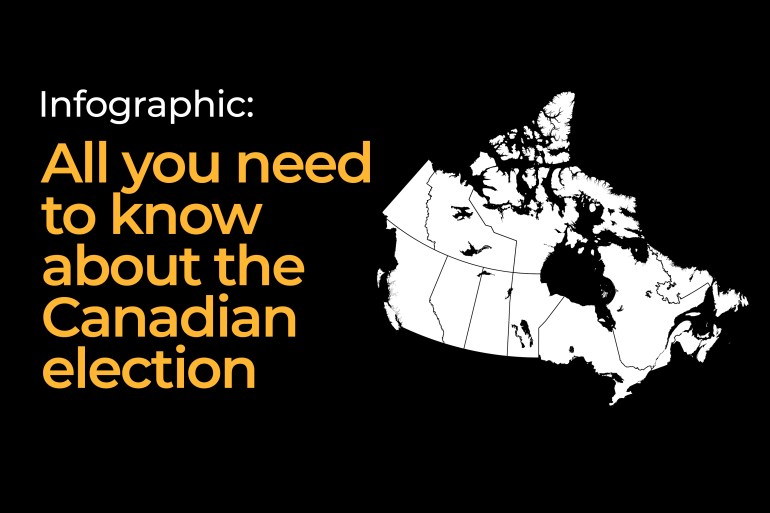
Canadians go to the polls on Monday. Here’s what you need to know about the parties, leaders, and key election issues.

More than 27 million people are eligible to vote as Canadians on September 20 will elect the country's next parliament [Al Jazeera]
By Alia Chughtai
19 Sep 2021
Canadians will vote on Monday to elect the country’s 44th Parliament after a campaign that has seen Prime Minister Justin Trudeau‘s Liberal Party in a tight race against the opposition Conservatives.
More than 27 million people are eligible to vote, according to Elections Canada, which reported this week that approximately 5.78 million ballots have been cast in advance polls.
On election day, the polls open and close at staggered times across Canada, which stretches across several time zones. The last polls close on the country’s west coast at 7pm local time (02:00 GMT).
Election officials say the final results could be delayed in some close races as mail-in ballots, expected to number in the hundreds of thousands, are counted.
Here’s all you need to know about the Canadian electoral system, the key issues at the heart of this year’s campaign, who Canada’s main party leaders are, and what they have promised.
The system
Canada is a parliamentary democracy.
Monday’s vote will decide the 338 seats in the House of Commons, the lower house of parliament.
To achieve a majority government, a party needs to secure 170 seats.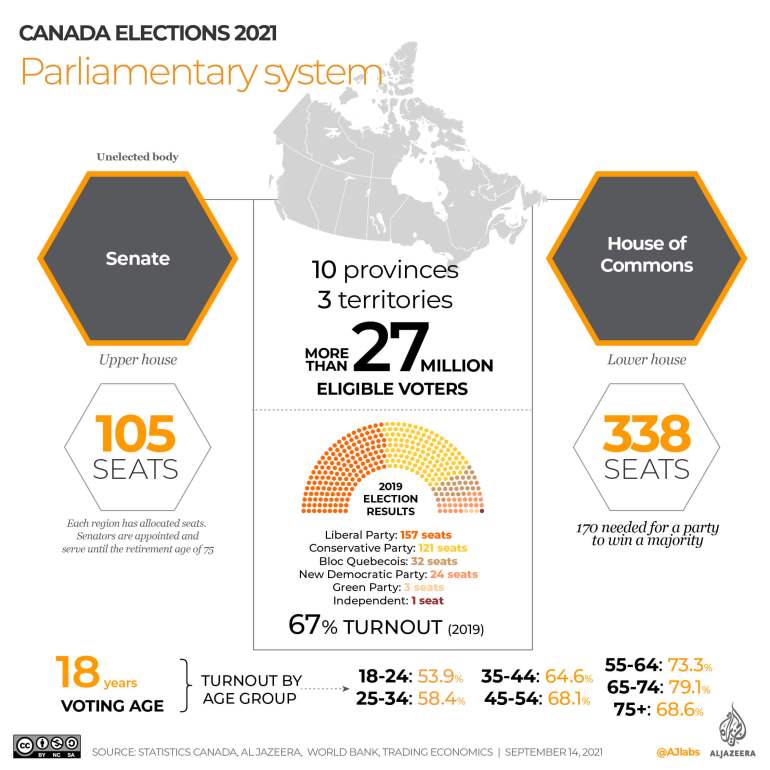
Key issues
The federal election campaign comes amid the COVID-19 pandemic.
Canada has reported more than 1.56 million cases and more than 27,300 coronavirus-related deaths to date, according to Johns Hopkins University data.
In addition to the pandemic, the economy, housing, the climate crisis and health care are some of the critical issues on the minds of Canadians ahead of Monday’s vote.
By Alia Chughtai
19 Sep 2021
Canadians will vote on Monday to elect the country’s 44th Parliament after a campaign that has seen Prime Minister Justin Trudeau‘s Liberal Party in a tight race against the opposition Conservatives.
More than 27 million people are eligible to vote, according to Elections Canada, which reported this week that approximately 5.78 million ballots have been cast in advance polls.
On election day, the polls open and close at staggered times across Canada, which stretches across several time zones. The last polls close on the country’s west coast at 7pm local time (02:00 GMT).
Election officials say the final results could be delayed in some close races as mail-in ballots, expected to number in the hundreds of thousands, are counted.
Here’s all you need to know about the Canadian electoral system, the key issues at the heart of this year’s campaign, who Canada’s main party leaders are, and what they have promised.
The system
Canada is a parliamentary democracy.
Monday’s vote will decide the 338 seats in the House of Commons, the lower house of parliament.
To achieve a majority government, a party needs to secure 170 seats.

To win a majority, a party must get 170 seats in the House of Commons [Alia Chughtai/Al Jazeera]
Key issues
The federal election campaign comes amid the COVID-19 pandemic.
Canada has reported more than 1.56 million cases and more than 27,300 coronavirus-related deaths to date, according to Johns Hopkins University data.
In addition to the pandemic, the economy, housing, the climate crisis and health care are some of the critical issues on the minds of Canadians ahead of Monday’s vote.

COVID-19, the economy, housing, the climate crisis and health care are some of the critical issues on the minds of Canadians [Alia Chughtai/Al Jazeera]
Poll numbers
The Liberals, headed by Trudeau, and the Conservative Party, led by Erin O’Toole, have been neck-and-neck throughout the campaign, each polling at about the 31 to 32-percent mark. But the Liberals are projected to secure more seats in parliament than the Conservatives.
Jagmeet Singh’s New Democratic Party has come in third with about 20-percent support.
Here’s how the parties stacked up as of September 19:
Liberal Party
Trudeau has faced criticism for calling an election two years ahead of schedule, but he defended the decision by saying he wanted Canadians to have a say in how the country recovers from the COVID-19 pandemic.
But the Liberal leader has been met by angry protesters on the campaign trail, with demonstrators denouncing mandatory vaccines and other public health measures.
Last week, after groups of anti-vaxxers organised protests outside Canadian hospitals, Trudeau announced that if re-elected, his party would make it an offence to block access to healthcare facilities or to harass healthcare workers and patients seeking care.

Poll numbers
The Liberals, headed by Trudeau, and the Conservative Party, led by Erin O’Toole, have been neck-and-neck throughout the campaign, each polling at about the 31 to 32-percent mark. But the Liberals are projected to secure more seats in parliament than the Conservatives.
Jagmeet Singh’s New Democratic Party has come in third with about 20-percent support.
Here’s how the parties stacked up as of September 19:

The Liberals and Conservatives have been in a tight race
[Alia Chughtai/Al Jazeera]
Liberal Party
Trudeau has faced criticism for calling an election two years ahead of schedule, but he defended the decision by saying he wanted Canadians to have a say in how the country recovers from the COVID-19 pandemic.
But the Liberal leader has been met by angry protesters on the campaign trail, with demonstrators denouncing mandatory vaccines and other public health measures.
Last week, after groups of anti-vaxxers organised protests outside Canadian hospitals, Trudeau announced that if re-elected, his party would make it an offence to block access to healthcare facilities or to harass healthcare workers and patients seeking care.

Justin Trudeau represents the electoral district of Papineau in Montreal, Quebec [Al Jazeera]
Conservative Party
The Conservative Party has made gains since the start of the election campaign, getting into a close race against the Liberals.
O’Toole, the party leader, has promised billions in new investments if elected and says the Conservatives would balance the budget in 10 years “without cuts” through its economic stimulus and growth plan.
Earlier in the campaign, the Conservatives faced public backlash for saying they would roll back some gun control measures that Trudeau’s government enacted last year. O’Toole later went back on that pledge, saying he would keep the curbs in place.
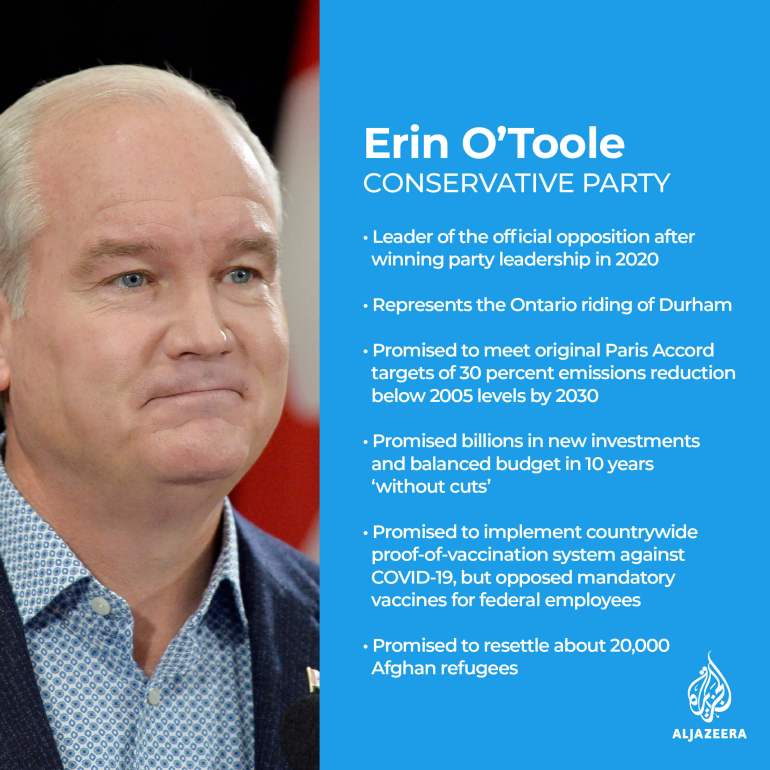
Conservative Party
The Conservative Party has made gains since the start of the election campaign, getting into a close race against the Liberals.
O’Toole, the party leader, has promised billions in new investments if elected and says the Conservatives would balance the budget in 10 years “without cuts” through its economic stimulus and growth plan.
Earlier in the campaign, the Conservatives faced public backlash for saying they would roll back some gun control measures that Trudeau’s government enacted last year. O’Toole later went back on that pledge, saying he would keep the curbs in place.

Erin O’Toole won the Conservative Party leadership in 2020 [Al Jazeera]
New Democratic Party
Singh, the first person of colour to lead a federal party in Canada, and his left-leaning New Democratic Party are proposing a $20 minimum wage and 10 days of paid sick leave for all federally regulated workplaces which include, amongst others, airlines, banks and most Crown corporations.
The NDP also has pledged to reduce carbon emissions to 50 percent below 2005 levels by 2030.
Late last month, Singh emerged as the most likeable federal party leader in an Ipsos poll; 45 percent of respondents viewed him favourably, compared with 41 percent for Trudeau, who finished second.

New Democratic Party
Singh, the first person of colour to lead a federal party in Canada, and his left-leaning New Democratic Party are proposing a $20 minimum wage and 10 days of paid sick leave for all federally regulated workplaces which include, amongst others, airlines, banks and most Crown corporations.
The NDP also has pledged to reduce carbon emissions to 50 percent below 2005 levels by 2030.
Late last month, Singh emerged as the most likeable federal party leader in an Ipsos poll; 45 percent of respondents viewed him favourably, compared with 41 percent for Trudeau, who finished second.

Jagmeet Singh in 2017 became the first visible minority leader of a federal party in Canada [Al Jazeera]
Bloc Quebecois
Yves-Francois Blanchet is the leader of the Bloc Quebecois, a party that only runs candidates in the French-speaking province of Quebec.
Under Blanchet, who represents Beloeil-Chambly, a riding (electoral district) south of Montreal, the party increased its seats in Parliament from 10 to 32 in the last federal election in 2019.
The party says it will introduce a bill making sufficient French-language knowledge a condition for granting Canadian citizenship to immigrants in Quebec, and it has also called for no interference from Ottawa on Quebec laws. That demand comes in light of a controversial provincial law known as Bill 21 that bars some public servants from wearing religious symbols – such as the hijab – while on the job.
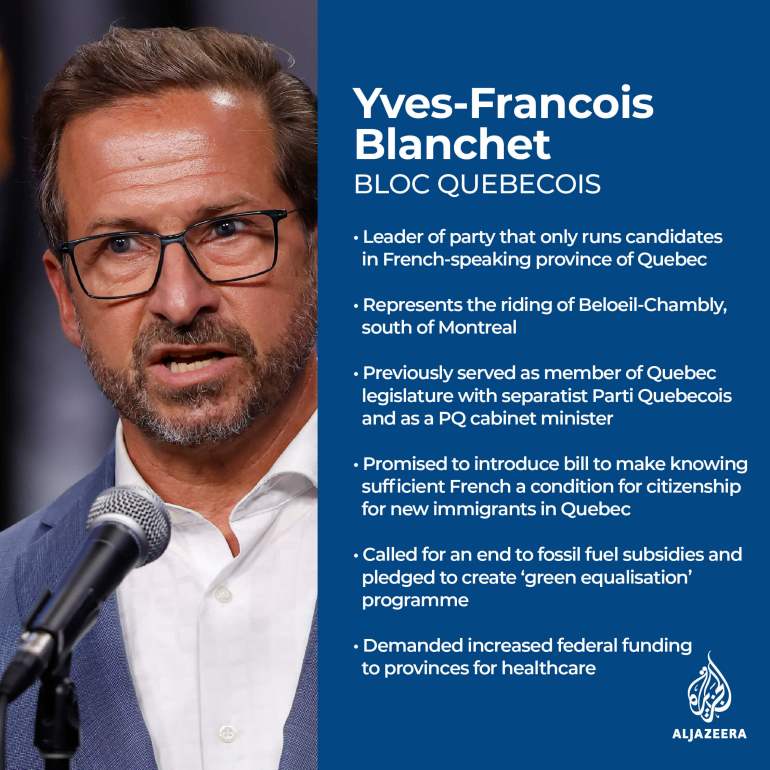
Bloc Quebecois
Yves-Francois Blanchet is the leader of the Bloc Quebecois, a party that only runs candidates in the French-speaking province of Quebec.
Under Blanchet, who represents Beloeil-Chambly, a riding (electoral district) south of Montreal, the party increased its seats in Parliament from 10 to 32 in the last federal election in 2019.
The party says it will introduce a bill making sufficient French-language knowledge a condition for granting Canadian citizenship to immigrants in Quebec, and it has also called for no interference from Ottawa on Quebec laws. That demand comes in light of a controversial provincial law known as Bill 21 that bars some public servants from wearing religious symbols – such as the hijab – while on the job.

The Bloc Quebec bills itself as the only party to defend Quebec’s interests at the federal level [Al Jazeera]
Green Party
The Green Party won three seats in the last federal election.
Annamie Paul won the party leadership last year but, along with Maxime Bernier, she is one of two federal party leaders who are not members of parliament after she lost a by-election in Toronto Centre in October 2020. She is campaigning for that same seat in this election.
The Greens’ platform primarily focuses on the environment, and the party has pledged to reduce greenhouse gas emissions by 60 percent from 2005 levels by 2030.
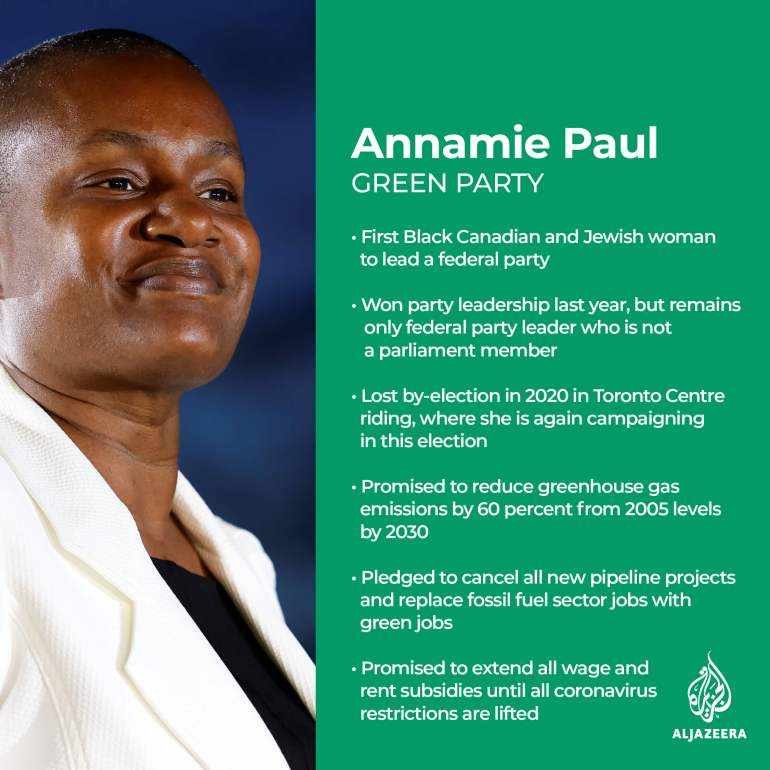
Green Party
The Green Party won three seats in the last federal election.
Annamie Paul won the party leadership last year but, along with Maxime Bernier, she is one of two federal party leaders who are not members of parliament after she lost a by-election in Toronto Centre in October 2020. She is campaigning for that same seat in this election.
The Greens’ platform primarily focuses on the environment, and the party has pledged to reduce greenhouse gas emissions by 60 percent from 2005 levels by 2030.

The Green Party has promised to cancel all new pipeline projects in Canada [Al Jazeera]
People’s Party
The far-right People’s Party has no representative in Parliament and got only 1.6 percent of the vote in 2019.
Leader Maxime Bernier formed the party in 2018 after he narrowly lost the Conservative leadership race. Under the PPC banner, Bernier lost his seat in Quebec’s rural Beauce riding, which he had held since 2006, in the last federal election.
The PPC is running on an anti-coronavirus vaccine and anti-immigration platform.
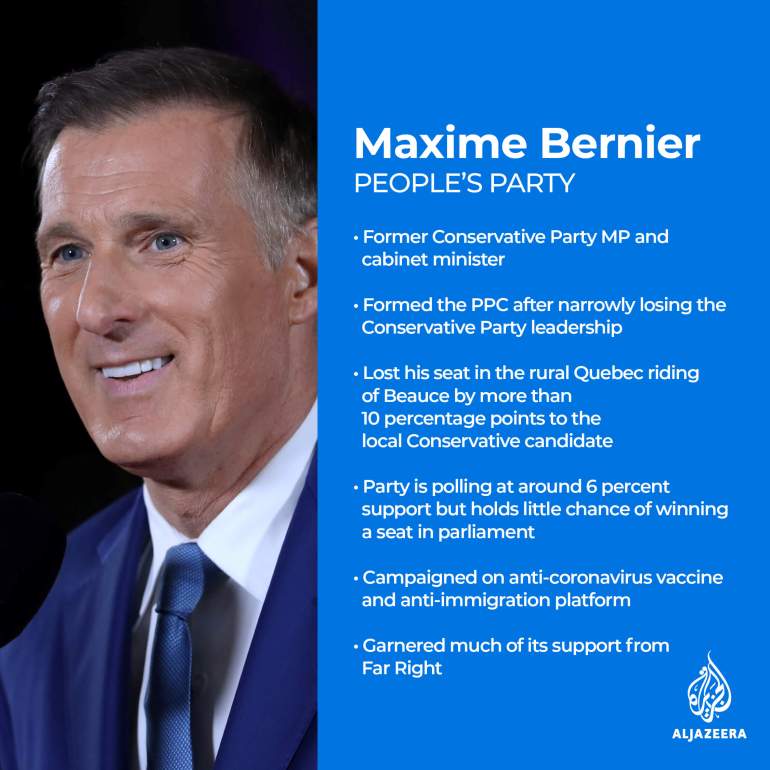
People’s Party
The far-right People’s Party has no representative in Parliament and got only 1.6 percent of the vote in 2019.
Leader Maxime Bernier formed the party in 2018 after he narrowly lost the Conservative leadership race. Under the PPC banner, Bernier lost his seat in Quebec’s rural Beauce riding, which he had held since 2006, in the last federal election.
The PPC is running on an anti-coronavirus vaccine and anti-immigration platform.

Bernier, a former Conservative MP and cabinet member, formed the PPC after losing the Conservative leadership race in 2017 [Al Jazeera]
SOURCE: AL JAZEERA
SOURCE: AL JAZEERA
No comments:
Post a Comment